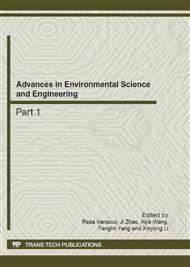[1]
Wenfeng, Liu Prof.Tu YongshanAda. Study on technologcial conditions of transesterification and the properties basic of biodiesel. (China University of Petroleum Publications, China 2008).
Google Scholar
[2]
S.T. Keera, S.M. El Sabagh, A.R. Taman Ad. Transesterification of vegetable oil to biodiesel fuel using alkaline catalyst. Fuel 90 (2011) 42–47.
DOI: 10.1016/j.fuel.2010.07.046
Google Scholar
[3]
A. Banerjee, R. Chakraborty.Parametric sensitivity in transesterification of waste cooking oil for biodiesel production—A review.Resources, Conservation and Recycling 53 (2009) 490–497
DOI: 10.1016/j.resconrec.2009.04.003
Google Scholar
[4]
Candeia RA, Silva MCD, Carvalho Filho JR, Brasilino MGA, Bicudo TC, Santos IMG, et al. Influence of soybean biodiesel content on basic properties of biodiesel–diesel blends. Fuel 88 (2009):738–43.
DOI: 10.1016/j.fuel.2008.10.015
Google Scholar
[5]
Tian Zhang, Yinnan Yuan. Environmental and economic benefit of biodiesel. Energy Environmental Protection, 2005,2(19):16-19.
Google Scholar
[6]
SunXue. Research of biodiesel preparation with solid acid catalysts from waste food oils. (Daqing Petroleum Institute Publications, China 2010).
Google Scholar
[7]
UtluZ. KoeakM. The effete of biodiesel fuel obtained from wastefrying oil on direct injection diesel engine Performance and exhaust emissions.Renewable Energy. 2008,33:1936-1941.
DOI: 10.1016/j.renene.2007.10.006
Google Scholar
[8]
DevanP. Mahalakshnli N. Performance, emission and combustion characteristics of Poon oil and diesel blends in a DI diesel engine. Fuel, 2009, 88: 861-867
DOI: 10.1016/j.fuel.2008.11.005
Google Scholar
[9]
Jinfang Yue, Chunli Zuo, Q Wang. Research Progress of Biodiesel Preparation from Waste Oil[J].GuangZhou Chemistry.2010.38(12),84-86.
Google Scholar
[10]
Kathlene Jacobson, Rajesh Gopinath, Lekha Charan Meher, Ajay Kumar Dalai. Solid acid catalyzed biodiesel production from waste cooking oil. Applied Catalysis B: Environmental 85 (2008) 86–91.
DOI: 10.1016/j.apcatb.2008.07.005
Google Scholar
[11]
Ayhan Demirbas, Sila Science, Trabzon, Turkey. Comparison of transesterification methods for production of biodiesel from vegetable oils and fats. Energy Conversion and Management 49 (2008) 125–130
DOI: 10.1016/j.enconman.2007.05.002
Google Scholar
[12]
Adriana Gog, Marius Roman, Monica Tos¸ Csaba Paizs, Florin Dan Irimie. Biodiesel production using enzymatic transesterification-Current state and Perspectives. Renewable Energy 39 (2012) 10-16
DOI: 10.1016/j.renene.2011.08.007
Google Scholar
[13]
Xin Deng, Zhen Fang , Yunhu Liu, Chang-Liu Yu. Production of biodiesel from Jatropha oil catalyzed by nanosized solidbasic catalyst. Energy 36 (2011) 777-784
DOI: 10.1016/j.energy.2010.12.043
Google Scholar
[14]
Prafulla D. Patil, Veera Gnaneswar Gude, and Shuguang Deng. Biodiesel Production from Jatropha Curcas, Waste Cooking, and Camelina Sativa Oils.Ind. Eng. Chem. Res. 2009, 48:10850–10856.
DOI: 10.1021/ie901146c
Google Scholar
[15]
ASrivastava A., Prasad R. Triglycerides-based diesel fue. Renewable Sustainable Energy ReV. 2000, 4: 111.
Google Scholar
[16]
Ayhan Demirbas. Biodiesel from waste cooking oil via base-catalytic and supercritical methanol transesterification. Energy Conversion and Management ,50 (2009) 923–927
DOI: 10.1016/j.enconman.2008.12.023
Google Scholar
[17]
Bojia Jin. Study on Biodiesel Preparation by Solid Acid Catalyst. (Hebei normal university Publications, China 2010).
Google Scholar
[18]
Jie Li: Biodiesel Production from Vegetable Oils with Methyl Acetate as Acyl Acceptor. (Huazhong University of Science&Technology Publications, China 2007).
Google Scholar
[19]
Wenfeng Liu: Study on Technologcial Conditions of Transesterification and the Basic Properties of Biodiesel. (China University of Petroleum Publications, China 2008).
Google Scholar


